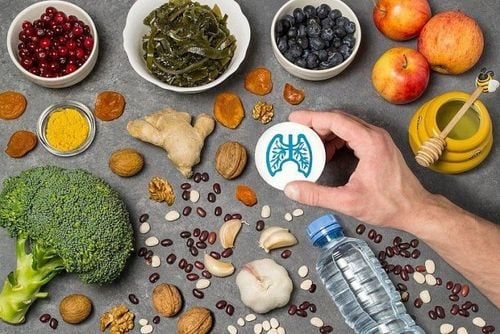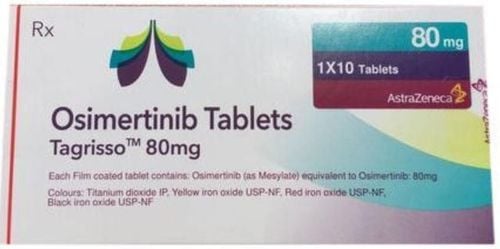This is an automatically translated article.
The article was professionally consulted by Dr. Le Thu Phuong - Pediatrician - Neonatologist, Department of Pediatrics - Neonatology, Vinmec Hai Phong International General Hospital.Respiratory illnesses in children can occur year-round but are more common during the changing seasons. When sick, children have symptoms such as prolonged fever, cough, runny nose, wheezing,... If parents are subjective and don't let the child go to the doctor and get treatment early, the child's respiratory illness may become worse. and can lead to dangerous complications.
1. Respiratory diseases in children are common in the changing seasons
Cold: When the cold virus invades the body, there will be respiratory symptoms such as fever, cough, runny nose, poor appetite and sore throat. These symptoms usually last about a week. Sometimes, the common cold can get worse, leaving many dangerous complications. Flu: Symptoms include fever, chills, fatigue, and muscle aches. Children with flu are often fussy, irritable, refuse to eat or have abdominal pain, diarrhea, respiratory tract inflammation (expression of sneezing, clear runny nose, cough, stuffy nose). Diphtheria: An infectious disease caused by the bacterium Corynebacterium diphtheriae. Symptoms usually appear 2 - 5 days after exposure. Initially, the child had a sore throat, cough, fever, and chills. Later, inside the child's throat and tonsils, thick white-gray membranes appear, growing in large patches, causing the child to have a dry cough and airway obstruction. If not detected and treated in time, the child may have myocarditis, damage to the nervous system,... Bronchiolitis: Caused by a virus, with symptoms including runny nose, rapid breathing, difficulty breathing , wheezing, cough and fever. RSV respiratory syncytial virus infection: If a child has a respiratory infection caused by RSV infection, the disease is often more severe, prone to respiratory failure, prolonged and recurrent illness. Children are at risk for complications from otitis media or asthma after a respiratory infection.
2. The reason why children often get respiratory diseases at the change of seasons
Common causes of respiratory diseases in children at the time of the change of season include:Children's resistance is still weak, the immune system is not yet complete to protect the body. Therefore, the virus easily attacks the body, causing respiratory diseases. Due to external factors such as environment, climate, weather, low community immunity or smoke, pollution, etc. Moreover, children have poor adaptability to weather, so when changing seasons, the weather changes. Hot and cold spots are erratic, children are prone to illness and respiratory diseases.

Sức đề kháng của trẻ em là một trong những nguyên nhân gây bệnh vào thời điểm giao mùa
3. What should be done when the child has a respiratory illness?
When a child has a respiratory infection and has symptoms such as cough, sneezing, runny nose but no fever or only a mild fever, the family can monitor the child at home, without the need for antibiotics and fever-reducing drugs. If the child coughs a lot, is tired, has a fever above 38°C and has difficulty breathing, parents need to quickly take the child to the nearest medical facility for timely medical examination and treatment, to prevent the risk of pneumonia. acute.When the child has not been taken to the doctor, if the child has a fever over 38°C, the child should not wear a lot of clothes, but should wear loose, airy, easy to escape heat. It is recommended to cool the baby by dipping a clean towel in a basin of clean water with a temperature of 2°C lower than the child's body temperature, then wiping the forehead, armpits, groin (every few hours) or applying a wet towel to the areas above position. If the child has a fever but still has a fever above 38°C, parents can give the child oral or rectal administration of Paracetamol with the dose recommended by the doctor (10 - 15 mg/kg body weight/time, not more than 60 mg/kg). weight/day).
Every day, children should eat warm, liquid foods and drink enough water. If the baby is still breastfed, breastfeed as usual or increase the frequency and duration of breastfeeding. If the child has a moderate or high fever but has not been taken to the doctor, the child should be given oresol solution (ORS), mixed according to the recommended dose.
4. Measures to prevent respiratory diseases in children at the change of season
To prevent respiratory diseases for children, the best measure is to strengthen the child's resistance and respiratory immunity. Parents can apply the following tips:Keeping children warm: Parents should keep their baby's airway warm in the winter by wearing warm clothes, keeping their throat warm, wearing a hat that covers their ears, and wearing a mask when going out. , eat and drink hot drinks, ... to reduce the risk of respiratory infections. Hygiene of body and environment: Bacteria and viruses can exist everywhere, potentially causing respiratory diseases for young children. To protect children from risks, parents should keep their baby's body clean and actively keep the living environment clean. For older children, it is necessary to practice personal hygiene so that they can take care of themselves even when their parents are not around.

Cha mẹ cần giữ ấm cho trẻ vào thời điểm giao mùa để tránh mắc bệnh đường hô hấp
As a key area of Vinmec Health System, Pediatrics Department - Vinmec International General Hospital always brings satisfaction to customers and is highly appreciated by industry experts thanks to the following advantages:
gathers a team of leading doctors and doctors in Pediatrics: including leading experts, with high professional qualifications (professors, associate professors, doctorates, masters), experienced, having worked in different hospitals. big hospitals like Bach Mai, 108.. The doctors are all well-trained, professional, have a heart - reach, understand young psychology. Besides domestic pediatricians, the Department of Pediatrics also has the participation of foreign experts (Japan, Singapore, Australia, USA) who are always pioneers in applying the latest and most effective treatment regimens. . Comprehensive services: In the field of Pediatrics, Vinmec provides a series of continuous medical examination and treatment services from Newborn to Pediatric and Vaccine,... according to international standards to help parents take care of their baby's health from birth to childhood. from birth to adulthood Specialized techniques: Vinmec has successfully deployed many specialized techniques to make the treatment of difficult diseases in Pediatrics more effective: neurosurgery - skull surgery, stem cell transplantation. blood in cancer treatment. Professional care: In addition to understanding children's psychology, Vinmec also pays special attention to the children's play space, helping them to have fun and get used to the hospital's environment, cooperate in treatment, improve the efficiency of medical treatment.














